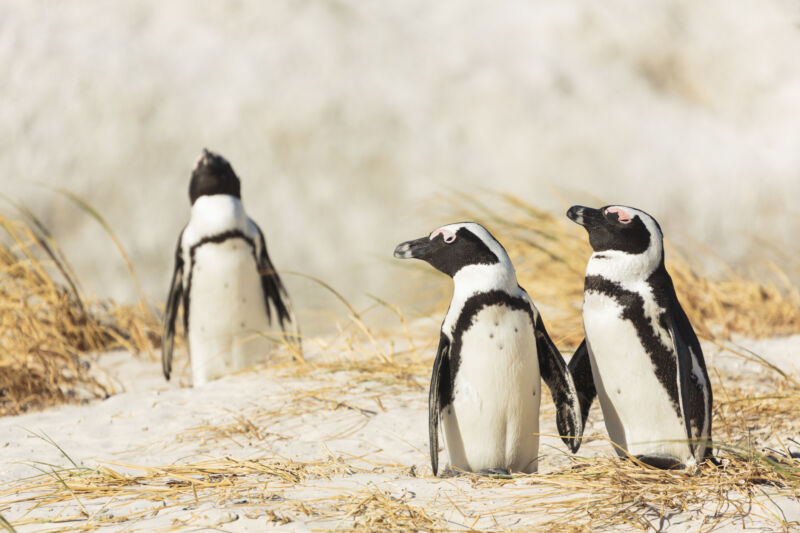
Enlarge / African penguins on a beach near Simon’s Town in South Africa.
CAPE TOWN, South Africa—A weathered, green building stands at the edge of the cozy suburban Table View neighborhood in Cape Town, just a few blocks down from a Burger King and a community library. Upon stepping inside, visitors’ feet squelch on a mat submerged in antibacterial liquid—one of the first signs this isn’t just another shop on the street.
A few steps further down the main hallway, a cacophony of discordant brays and honks fill the air. A couple more strides reveal the source of these guttarall calls: African penguins.
Welcome to the nonprofit Southern African Foundation for the Conservation Of Coastal Birds’ hatchery and nursery, where hundreds of these birds are hand-reared after being injured or abandoned in the wild.
While this conservation center is a flourishing refuge for African penguins, the species as a whole is in dire straits. Over the past century, African penguin populations have plummeted, dropping from around one million breeding pairs in the early 1900s to less than 10,000 in 2023 as environmental conditions have worsened due to increased fishing pressure and climate change, which have both decreased fish populations on which penguins rely.
The climate crisis has also fueled more frequent and severe weather events in South Africa such as floods and heat waves, resulting in an increased number of penguin parents abandoning their eggs to seek refuge.
The staff at the Foundation is working to hand-rear penguins with the goal to release most of them back into one of the threatened Cape colonies they came from. But some of these penguins are destined for a different destination: a rocky outcropping along the Eastern Cape of South Africa within the De Hoop Nature Reserve.
There, scientists and conservationists are working to establish a new penguin colony, which they hope will become a stronghold for the entire African penguin species.
The ecological trap
It’s difficult to pin a single threat to the demise of African penguins; oil spills, avian flu and extreme weather events have wreaked havoc on colonies across South Africa. These chronic issues combine with freak incidents: In 2021, a swarm of bees killed more than 60 African penguins on the popular Boulders Beach in Cape Town and, a year later, two huskies killed 19 penguins in the same area.
However, scientists say that one of the main causes of the seabirds’ decline is the intense fishing pressure on sardines and anchovies, the penguin’s main diet.
Fighting unemployment, low-income people fish around coastal beaches to support themselves, said Shanet Rutgers, an animal health technician at the Two Oceans Aquarium in South Africa, and there is a large commercial industry for purse-seine fishing, in which a wall of netting is cast around a school of fish.
“When they pull out too much fish in the ocean, they leave the colonies with almost little to nothing to feed on,” she said.